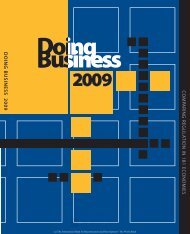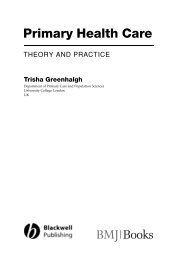Download File - JOHN J. HADDAD, Ph.D.
Download File - JOHN J. HADDAD, Ph.D.
Download File - JOHN J. HADDAD, Ph.D.
Create successful ePaper yourself
Turn your PDF publications into a flip-book with our unique Google optimized e-Paper software.
80 Teofilovici and Wentworth<br />
In the metastatic disease setting, surrogate markers related to tumor<br />
response can be utilized. In the earlier-disease/adjuvant treatment setting, however,<br />
in which tumor response cannot be assessed, a reliable marker has yet to be<br />
identified. In this better-prognosis setting, there are many scientific and technological<br />
hurdles to be overcome, even ones as basic as availability of immunoassays<br />
that are amenable to routine use and can undergo adequate validation.<br />
Work continues in the development of reliable immunological biomarkers.<br />
Following the 2006 Meeting of the Cancer Vaccine Consortium, Finke<br />
et al. identified the challenges of developing effective anticancer immunotherapies<br />
as related to the following factors: (1) underlying heterogeneity in<br />
some of the cancers and patient cohorts selected for study, (2) the longer time<br />
required to establish an effective cellular immune response versus the observation<br />
period designed into the study, and (3) diminished immunocompetence in<br />
patients with high tumor burden. Planning for phase 3 trials also encounters the<br />
difficulty that arise when using historical data to estimate the mean survival time<br />
or other end points in the control or experimental groups and aggressive projections<br />
of the ultimate benefit of active cancer immunotherapy. Finally, there is<br />
the long time and high cost of running clinical studies with cancer vaccines (31).<br />
REGULATORY CONSIDERATIONS AND A NEW CLINICAL PARADIGM<br />
There are a few regulatory considerations that have the opportunity to facilitate<br />
clinical development of cancer vaccines. In December 2006, the U.S. FDA issued<br />
a proposed rule to amend the regulation concerning charging patients for investigational<br />
new drugs (INDs). If the proposed role becomes effective as currently<br />
written, it will permit charging for a broader range of investigational uses than<br />
presently allowed. This allowance could provide a potential mechanism to help<br />
partially fund the necessary long and expensive late-stage trials of cancer vaccines.<br />
A new mechanism for drug approval was recently adopted in Europe that<br />
allows for granting a conditional marketing authorization (CMA) prior to full<br />
marketing approval for a treatment that preliminarily indicates a positive riskbenefit<br />
assessment in late-stage trials. In life threatening or orphan disease settings,<br />
CMAs allow patient access to treatments that have demonstrated clinically meaningful<br />
but less statistically robust findings, which require subsequent confirmation<br />
in post-marketing trials. CMAs provide an opportunity for more comprehensive<br />
cost recovery compared with charging patients for investigational treatments.<br />
A new development paradigm for cancer vaccines was recently proposed by<br />
the Cancer Vaccine Clinical Trial Working Group (CVCTWG), a group of more<br />
than 50 experts from academia, regulatory bodies, and the biotech/pharmaceutical<br />
industry from America and Europe (32). The authors propose a clinical development<br />
model in which therapeutic cancer vaccines are investigated in two general<br />
types of clinical studies: proof-of-principle trials and efficacy trials. Designed to<br />
account for biologic features of cancer vaccines, the proposed paradigm “supports<br />
a more flexible, expeditious, and focused clinical developmental process with

















